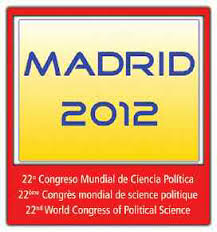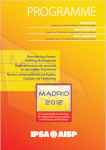
The 22nd IPSA World Congress of Political Science held in Madrid from July 8 to 12, 2012 drew a record 3,081 participants, not including staff and exhibitors. Participants from 83 countries came to share their ideas and discuss the event’s main theme, “Reshaping Power, Shifting Boundaries.”
More than ever, women played a significant role in the event, representing 42% of registered participants. Students accounted for 19% of congress participants.
A total of 5,254 paper proposals were submitted and close to 3,000 abstracts were accepted for the final congress program. Over the five busy days spanning our congress, some 609 panels and 2,285 papers were presented, making the 2012 program the largest ever!
Research committees played an important role in World Congress program, offering 377 cohesive panels on their respective areas of research, 24 of which were jointly organized by RCs with shared interests.
Congress Theme
Reshaping Power, Shifting Boundaries
In a globalising world, everywhere power is being reconfigured, creating opportunities for change:
- New players are emerging on the world stage, reflected in G-20, the ‘BRICs’ and in North-South relations.
- Climate change and the financial crisis have altered global dynamics.
- Transnational governance is taking on new forms, such as the reformed EU and Mercosur.
- Within states, there is increased devolution and the recognition of sub-identities.
- State functions are increasingly being shared with non-state actors such as corporations and non-governmental organisations and are affected by the dynamics of an international society.
- Substantial changes are taking place in social life including gender roles and the nature of the family.
- Religious cleavages refuse to disappear, and may be evolving into a major axis of political and social conflict.
- The Westphalian model of inter-state relations is not sufficient to cope with the challenges of global governance. This emphasises the importance of the dialogue between political science and international relations.
The nation-state remains the key crucible of power in terms of elections, public policy and in international negotiations, but it faces new challenges. Territory and power no longer align. Boundaries and borders are shifting.
Boundaries can be geographical, social, cultural, religious or economic. We need to understand how they are created and interpreted. Every boundary is an expression and exercise of power and this raises normative issues, particularly those relating to justice and the divisions between public and private and at the global level between North-South and South-South relations. The debate about the centrality of trust in social and political life has been reactivated.
How we frame these issues depends in part on our disciplinary assumptions and methodologies. We need to think again about how to conceptualise power, for example in terms of legitimacy, sovereignty or questions of global governance/locality. Boundaries within our discipline and with other disciplines are shifting. Space and scale are becoming increasingly important in the thinking of political science. What other tools or multi-method approaches do we need to respond to these changes? Political science can play an important role in informing the choices that come with the reshaping of power.
The main congress themes are:
- Comparative Politics and Political Institutions
- Gender, Religion, Identity
- International Political Economy
- International Relations
- Political Behavior
- Political Theory
- Public Policy
We invite you to share your research on the reshaping of power and shifting boundaries at the World Congress of the International Political Science Association, in Madrid 2012.
Photos and Videos
Photos
Please visit our Flickr page to view pictures of the 22nd IPSA World Congress.
Photo credit: International Political Science Association.
Videos
Ceremonies
- 2012-07-08 Opening Ceremony
- 2012-07-12 Closing Ceremony
Plenary Sessions
- 2012-07-10 Making Democratic Governance Work (Pippa Norris)
- 2012-07-11 President's Plenary: Is there a Global-Democratic Citizen? (Leonardo Morlino)
Special Sessions
Award Sessions
- 2012-07-10 Meisel-Laponce Award Lecture - Jørgen Møller and Svend-Erik Skaaning
- 2012-07-11 Karl Deutsch Award Ceremony - Alfred Stepan
- 2012-07-12 Prize of the Foundation Mattei Dogan - Award Lecture - Klaus von Beyme












